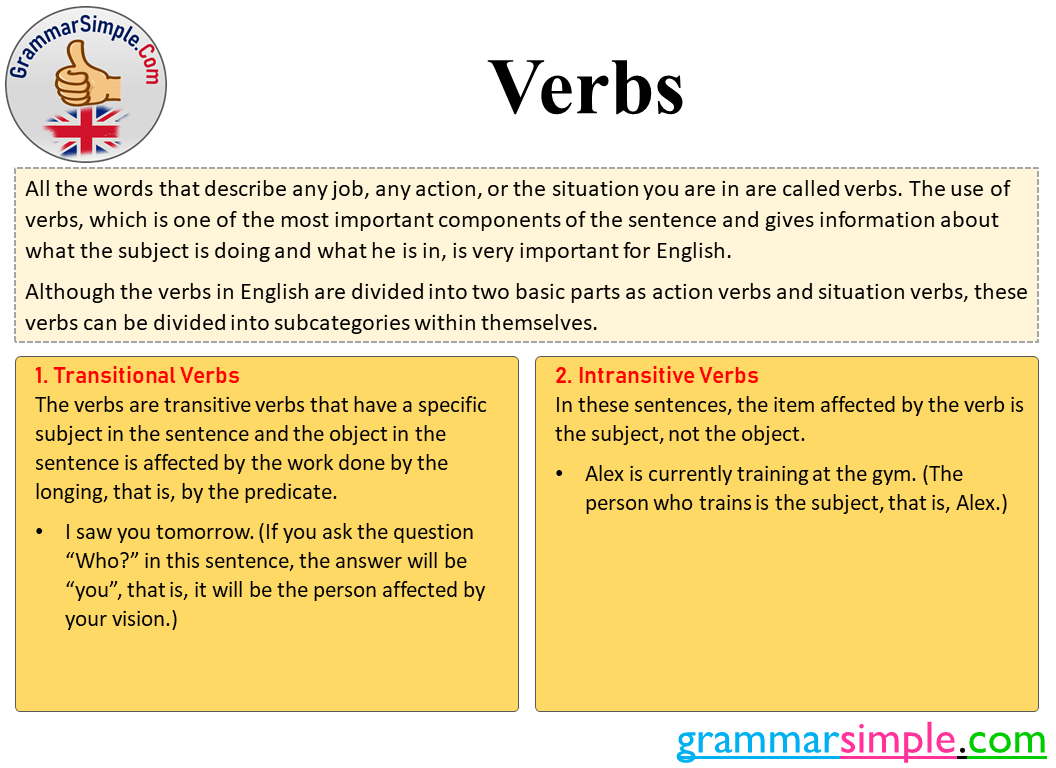What is Verb? Types of Verbs, Definition and Example Sentences


What is Verb? Types of Verbs, Definition and Example Sentences
Table of Contents
Verbs
All the words that describe any job, any action, or the situation you are in are called verbs. The use of verbs, which is one of the most important components of the sentence and gives information about what the subject is doing and what he is in, is very important for English.
Although the verbs in English are divided into two basic parts as action verbs and situation verbs, these verbs can be divided into subcategories within themselves.
What are Non-Stative Verbs / Action Verbs?
These verbs, which are the words responsible for describing what the subject in a sentence is doing, should be content that can be observed by other people. These verbs are divided into transitive verbs and intransitive verbs.
1. Transitional Verbs
The verbs are transitive verbs that have a specific subject in the sentence and the object in the sentence is affected by the work done by the longing, that is, by the predicate. It is possible to reach the object by asking the loading What and Whom questions in this sentence.
I saw you tomorrow. (If you ask the question “Who?” in this sentence, the answer will be “you”, that is, it will be the person affected by your vision.)
2. Intransitive Verbs
In these sentences, the item affected by the verb is the subject, not the object.
Alex is currently training at the gym. (The person who trains is the subject, that is, Alex.)
What are Stative Verbs / Non-Action Verbs?
In case verbs, which are verbs that talk about a situation rather than an action, there should be no action during the situation. So you have to talk about an emotion, a possession, a sensation, a thought, and an intuition, not an act of running. We can tabulate the example verbs for status verbs as follows:
| Emotion | image, hope, suspect, remember, believe, forget, wonder, consent, accept, deny |
| Feeling | feel, love, hate, like, want, wish |
| Sensation | see, smell, hear, taste, tadı, sense, seem, look like, sound |
| Possession | have, own, contain, belong, include, obtain, owe, concern, depend, consist, lack |
What are Stative and Non-Stative Verbs?
Although many verbs can be used both to describe a situation and to express actions, their meanings will be different each time. What makes the meanings different is that the verb takes -ing suffix. Verbs that do not have the -ing suffix express the present tense, while verbs that do express the present tense. Verbs that are both situational and action verbs are have, think, see, taste, feel and be.
He has a huge refrigerator.
He is currently having breakfast with many kinds of breakfast items.
I think I can easily pass this exam.
I was thinking how beautiful all the memories we had last year were.
After we get married two days later I will be with you forever, no matter what I promised to be with you.
We do not think that there is any problem with our child, but he is being naughty enough to be hyperactive.
Recent Posts
Use Rose in a Sentence, How to Use Rose with Example Sentences
Use Rose in a Sentence, How to Use Rose with Example Sentences
Use Yourself in a Sentence, How to Use Yourself with Example Sentences
Use Yourself in a Sentence, How to Use Yourself with Example Sentences
Use Picture in a Sentence, How to Use Picture with Example Sentences
Use Picture in a Sentence, How to Use Picture with Example Sentences
Use Claim in a Sentence, How to Use Claim with Example Sentences
Use Claim in a Sentence, How to Use Claim with Example Sentences
Use Treasure in a Sentence, How to Use Treasure with Example Sentences
Use Treasure in a Sentence, How to Use Treasure with Example Sentences
Use Raise in a Sentence, How to Use Raise with Example Sentences
Use Raise in a Sentence, How to Use Raise with Example Sentences